Notes: Thurstone Group Factor Theory of Intelligence | Child Development and Pedagogy for CTET Preparation - CTET & State TET PDF Download
Thrustone’s Theory of Intelligence
Thurstone's Multi-Factor Theory of Intelligence is based on the fundamental concepts and methods used in Spearman's Two-Factor Theory of Intelligence. However, Thurstone refined Spearman's factor analysis technique by incorporating advanced statistical methods, such as factor analysis and matrix algebra, to obtain a more detailed understanding of human intelligence. He aimed to dissect the structure of cognitive abilities by focusing on specific skill-based factors, rather than assuming a single overarching intelligence factor.
Thurstone's Research Approach
Thurstone conducted 57 psychological mental ability tests on a group of subjects, analyzing their scores using the inter-correlation technique and matrix algebra. His findings led him to challenge Spearman’s concept of a single general intelligence (g-factor). Instead, he proposed that intelligence consists of seven distinct mental abilities, known as Primary Mental Abilities (P.M.A.). Unlike Spearman, Thurstone argued that these abilities were independent of one another and should be measured separately rather than relying solely on an Intelligence Quotient (IQ) score.
Seven Primary Mental Abilities
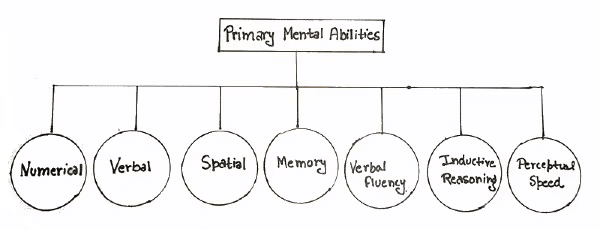
1. The Numerical Factor
- This aspect pertains to an individual's proficiency in executing rapid and accurate numerical calculations.
- It can be assessed by evaluating how swiftly and precisely a person solves arithmetic problems.
2. The Verbal Factor
- This factor denotes the capability to comprehend and utilize various words and sentences within a language.
- Proficiency in this skill can be measured through vocabulary assessments, word jumble exercises, and verbal or reading comprehension tests.
3. The Space Factor
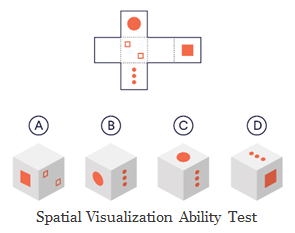
- The Space Factor measures how well a person can visualize and manipulate objects in space, whether real or imaginary.
- This skill involves understanding the relationships between different objects and their positions in space.
- Tests designed to assess the Space Factor often include a variety of puzzles and tasks that require spatial reasoning, such as:
- Solving puzzles that involve fitting shapes together or completing patterns.
- Recognizing and understanding different geometric shapes and their properties.
- Identifying the correct mirror image of an object, which tests the ability to visualize how an object would look when reflected.
- Selecting the right image of an object when it is rotated at different angles, requiring the ability to mentally rotate objects in space.
4. Memory
- Memory refers to the capacity to quickly remember and retain various concepts or phenomena for an extended period.
- It involves not only the initial recall of information but also the ability to hold onto this information over time.
- Memory tests, such as the learning of nonsense syllables, are used to evaluate this ability.
- Several factors influence the ability to recall concepts during examinations, including:
- Memory capacity, which is the amount of information that can be stored and recalled.
- Stress levels during exams, as high stress can negatively impact memory recall.
- Preparation methods, which can affect how well information is retained and recalled during tests.
5. Verbal Fluency/Word Fluency Factor
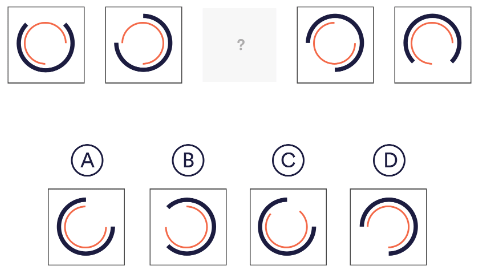
- Verbal fluency refers to the ability to quickly produce a series of distinct words or sentences.
- Individuals with strong verbal fluency are likely to excel in tasks that require rapid word generation.
- Conversely, those with poor verbal fluency may find such tasks challenging.
- This factor has a significant impact on a person's overall communication skills.
- Assessments of verbal fluency typically involve prompting participants to swiftly think of words that start or end with a specific letter.
6. Inductive Reasoning Factor
- Inductive reasoning is the capability to derive general concepts from specific instances.
- This skill is often evaluated through tests featuring number series, word series, and word or number classification tasks.
- Inductive reasoning assessments may require participants to identify an appropriate number or image based on a given sequence of numbers or images.
7. Perceptual Speed Factor
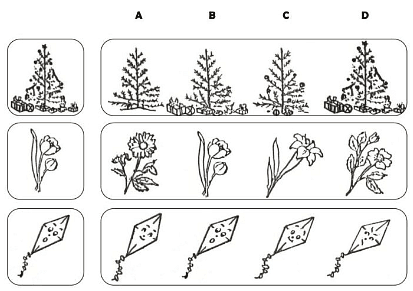
- The perceptual speed factor measures how quickly and accurately a person can recognize and compare images, numbers, or letters.
- This skill is crucial for tasks like proofreading, where attention to detail and speed are important.
- To evaluate perceptual speed, researchers use various tests, such as:
- Quick recognition of pictures.
- Identifying and crossing out specific letters within a set of numbers.
- Locating specific words within paragraphs of text.
8. The Deductive Reasoning Factor
- This factor assesses the ability to understand a specific situation or idea based on a broader principle.
- There are various aptitude tests designed to evaluate a person's deductive reasoning skills, which involve a series of statements.
- The individual taking the test must select the most appropriate logical conclusion based on the given statements.
9. Problem-Solving Ability Factor
- This factor measures a person's capability to tackle different general or aptitude-related problems.
- It can be assessed by looking at how individuals respond to various hypothetical situations.
- The emphasis is on their ability to draw logical conclusions from these scenarios.
Spearman’s Theory of Intelligence vs Thurstone’s Theory of Intelligence
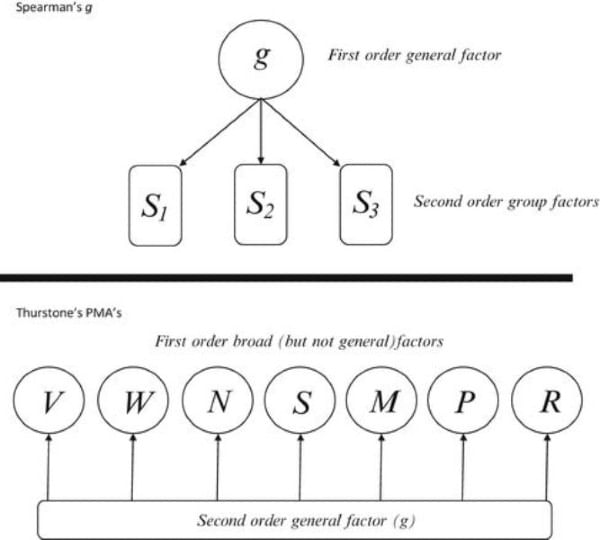
- Hans Eysenck, a British psychologist known for his research on intellectual development and personality, highlighted the differences in the conclusions drawn by Thurstone and Spearman.
- The disagreement stems from the distinct research methods employed in both theories.
- Firstly, the sample populations differed:
- Spearman's research focused on random individuals, primarily children.
- Thurstone's sample was limited to students.
- The second reason lies in the different types of mental tests used:
- Spearman's tests were varied; had they been similar, the "s" factor (specific ability) might have overlapped, leading to greater correlations among variables.
- Thurstone's tests were almost identical.
- Thurstone suggested that the seven primary mental abilities are independent.
- However, in his testing, he could not demonstrate the separateness of these abilities; instead, he identified the presence of the g factor.
- Through statistical analysis, he reconciled this contradiction by proposing the coexistence of a general factor and seven specific mental abilities.
- This understanding paved the way for other psychologists to develop various hierarchical and multiple intelligence theories.
- Therefore, it is incorrect to assert that Thurstone's theory contradicts Spearman's notion of general intelligence in his two-factor theory.
|
70 videos|154 docs|42 tests
|
FAQs on Notes: Thurstone Group Factor Theory of Intelligence - Child Development and Pedagogy for CTET Preparation - CTET & State TET
| 1. What is Thurstone's Group Factor Theory of Intelligence? |  |
| 2. How does Thurstone's Theory of Intelligence differ from other theories of intelligence? |  |
| 3. What are the primary mental abilities according to Thurstone's Group Factor Theory of Intelligence? |  |
| 4. How does Thurstone's Theory of Intelligence impact education and testing? |  |
| 5. What is the relevance of Thurstone's Theory of Intelligence in today's context? |  |
















